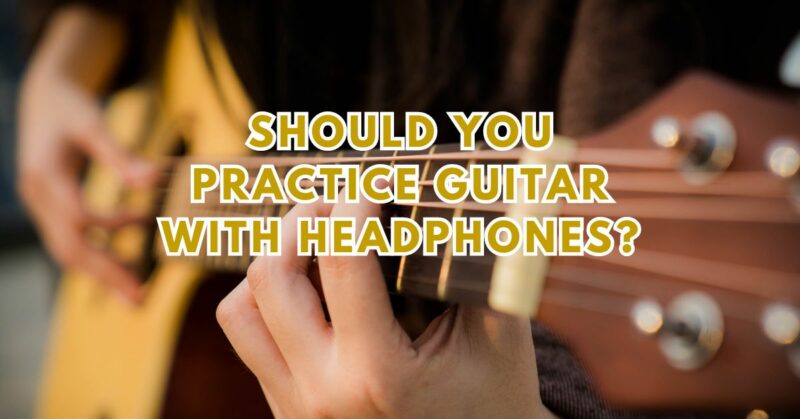Practicing the guitar is a crucial aspect of becoming a skilled and proficient player. However, the question of whether to practice with headphones is one that many guitarists ponder. The decision to use headphones during guitar practice has its pros and cons, and it ultimately depends on your goals, preferences, and the context in which you’re practicing. Here, we’ll explore the advantages and disadvantages of practicing guitar with headphones to help you make an informed decision.
Advantages of Practicing Guitar with Headphones:
1. Noise Control: One of the most significant benefits of using headphones is noise control. When you practice with headphones, you can enjoy your guitar playing without disturbing others around you. This is particularly useful if you live in a shared space, an apartment, or a dormitory.
2. Focus and Concentration: Headphones can help you concentrate on your playing by eliminating external distractions. You can immerse yourself in your music without interruptions from background noise or conversations.
3. Late-Night Practice: If you have a desire to practice late at night or during quiet hours, headphones allow you to do so without worrying about waking up neighbors or family members. This flexibility can be invaluable for those with busy schedules.
4. Tone Experimentation: Many guitar amplifiers have built-in headphone jacks or emulated headphone outputs. Using headphones allows you to experiment with different tones, effects, and settings without the need for a loud amplifier. This can be especially helpful for fine-tuning your sound in a quiet environment.
Disadvantages of Practicing Guitar with Headphones:
1. Isolation: While headphones provide focus, they can also isolate you from the natural sound of your guitar and the room’s acoustics. This isolation may affect your ability to develop a good sense of timing and dynamics.
2. Limited Feedback: When practicing with headphones, you may miss out on important auditory feedback, such as string noise, fret buzz, or the nuances of your playing technique. This can hinder your ability to make necessary adjustments and improvements.
3. Volume Control: Some guitarists tend to play at higher volumes when using headphones, which can be damaging to your hearing over time. It’s essential to be mindful of the volume level and protect your hearing.
4. Performance Preparation: If you plan to perform on stage or with others, practicing exclusively with headphones may not adequately prepare you for the dynamics and sound of live amplification. Playing with an amplifier can provide a more realistic rehearsal experience.
Conclusion:
Practicing guitar with headphones can be a valuable tool in your practice routine, especially when noise control, concentration, or late-night practice is essential. However, it’s essential to strike a balance. To develop as a well-rounded guitarist, consider combining headphone practice with sessions where you play through an amplifier to maintain a connection with the instrument’s natural sound and performance dynamics.
Ultimately, the decision to use headphones while practicing guitar is a matter of personal preference and circumstance. Assess your goals and surroundings to determine when and how headphone practice fits into your overall practice routine. By doing so, you can enjoy the benefits of both worlds and become a more versatile and skilled guitarist.


